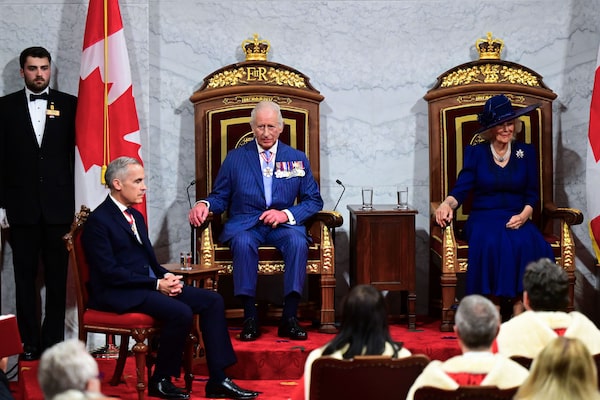OTTAWA, ON – As King Charles III himself prepared to address the Canadian Parliament, a symbolic act underscoring Canada’s historical allegiance, a familiar, yet increasingly assertive, drumbeat of dissent echoed from Quebec. The province, a historic cradle of French culture in North America, finds itself once again publicly grappling with the gilded chains of a monarchy it largely sees as foreign, a relic, and an unwelcome guest at the table of its distinct identity.
This is a slow-burn constitutional drama playing out, a testament to Canada’s complex, often contradictory, relationship with the British Crown. While much of Canada recently shows a surprising bump in affection for the monarchy, seeing it, ironically, as a defining feature against the colossal cultural and political pull of the United States, Quebec remains the steadfast dissenter. The recent Ipsos poll in May 2025 revealing that overall Canadian support for severing ties with the monarchy has dropped to 46% (down 12 points since 2023) starkly contrasts with sentiment in Quebec, where, as an Angus Reid poll the same month found, a mere 14% envision a long-term future with the royals.
The latest flashpoint? The very existence and funding of the King’s representative in Quebec, the Lieutenant-Governor. The position, currently held by Manon Jeannotte, a member of the Mi’kmaq Nation appointed in December 2023, became an immediate symbol of this divide. The day after her historic appointment, a nod towards reconciliation, Quebec’s National Assembly unanimously passed a motion calling for the abolition of her office. The message was blunt.
Leading the charge, as it often does on such matters, is the left-wing sovereigntist party, Québec solidaire (QS). “What a bizarre country Canada is,” Ruba Ghazal, now a co-spokesperson for QS, declared earlier in this ongoing debate, a sentiment that still captures the party’s core frustration.
“To affirm its sovereignty, it believes it is important to bring the monarch of a foreign country here to talk about its priorities.”
Ghazal
QS, which successfully campaigned to make the oath of allegiance to the King optional for Quebec’s elected Members of the National Assembly in late 2022, now wants the province to stop paying for the Lieutenant-Governor’s expenses- office, staff, car, and driver – which amounted to a provincially budgeted $758,000 in the past year. The salary itself is a federal responsibility.
From where I stand, having witnessed African nations meticulously dismantle colonial iconography and structures to forge new identities, Quebec’s actions resonate with a universal desire for self-definition. The symbols of power, even if largely ceremonial, carry immense weight. They tell a story. And for many in Quebec, the story of the British monarchy is one of conquest, not consent.
A King’s Welcome, A Province’s Reticence

The timing of King Charles III’s visit in May 2025 to deliver a Speech from the Throne, the first by a British monarch in Canada since 1977, only amplified these underlying tensions. While some Canadians, according to recent polling, see the monarchy as a “bulwark against American ambitions,” a unique identifier on a continent dominated by its southern neighbour, this view finds little purchase in Quebec. Here, the push is not just for differentiation from the U.S., but for a clearer distinction from its own royal past.
Manon Jeannotte, meanwhile, carries out her duties with a focus on reconciliation, recently unveiling a redesigned First Peoples Medal. Her office embodies the paradox: a representative of the Crown striving to heal colonial wounds, even as the institution she represents is itself questioned as a colonial remnant.
The Uphill Battle for a Crown-less Quebec
The path to actually abolishing the office of Lieutenant-Governor is a constitutional mountain. Under Section 41 of the Constitution Act, 1982, such a change requires the unanimous consent of the federal Parliament and all ten provincial legislatures. In a country as diverse and, at times, divided as Canada, unanimity on matters of national symbols and structure is a monumental, if not impossible, ask.
“The first step is to at least start talking about it,” Ghazal has insisted. And Quebec is certainly talking. The conversation, however, reveals complexities within the province itself.
While anti-monarchy sentiment is strong, a May 2025 poll indicated that while 32% support Quebec sovereignty (a slight increase), a significant 59% would still vote against outright separation from Canada. This suggests a nuanced desire: a wish to be masters in their own house, certainly free of royal symbols, but not necessarily a complete severing of Canadian ties for a majority.
Canada’s Evolving Crown
Canada’s journey to full independence from Britain was a gradual, polite unwinding, not a revolutionary snap. The Crown was woven into its fabric, seen by some as a guarantor of stability and parliamentary tradition. But traditions are not immutable. As demographics shift and new generations question old allegiances, the role and relevance of a hereditary monarch from across the Atlantic face renewed scrutiny.
Quebec’s persistent, principled stand serves as a constant catalyst for this national conversation. It forces Canada to look in the mirror and ask: Who are we, and who do we want to become? Does the path forward include a King, or is the tide, at least in its most historically distinct province, pulling irreversibly towards a shore where only the people are sovereign?
The King may have been welcomed in Ottawa with official pomp, but in Quebec, the debate over his enduring place in Canadian life is far from over. It’s a quiet rebellion, fought not with arms, but with motions, funding debates, and the unyielding assertion of a right to choose one’s own symbols of state. As Canada navigates its place in a complex world, the echoes from Quebec ensure that the question of the Crown will remain firmly on the national agenda.
